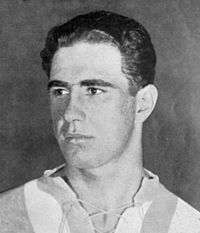Carlos Peucelle
 Peucelle in 1929. | |||
| Personal information | |||
|---|---|---|---|
| Full name | Carlos Desiderio Peucelle | ||
| Date of birth | 13 September 1908 | ||
| Place of birth | Buenos Aires, Argentina | ||
| Date of death | 1 April 1990 (aged 81) | ||
| Playing position | Attacking Midfielder, Right Winger | ||
| Youth career | |||
| Club Deportivo Anchorena | |||
| Boca Juniors | |||
| San Telmo | |||
| Sportivo Barracas | |||
| Senior career* | |||
| Years | Team | Apps | (Gls) |
| 1925–1926 | San Telmo | ? | (?) |
| 1927–1930 | Sportivo Buenos Aires | ? | (?) |
| 1931–1941 | River Plate | 307 | (143) |
| National team | |||
| 1928–1940 | Argentina | 29 | (12) |
| Teams managed | |||
| 1945–1946 | River Plate | ||
| 1954 | San Lorenzo | ||
| 1960 | Sporting Cristal | ||
| 1966 | River Plate | ||
| * Senior club appearances and goals counted for the domestic league only and correct as of July 2007 | |||
Carlos Desiderio Peucelle (13 September 1908 – 1 April 1990) was an Argentine football player who played as an inside forward or as a right winger and is considered one of Argentina's finest wingers in their history. He is also known for being the catalyst for starting "La Maquina" with River Plate who went on to dominate football in South America in the 1940s.
Playing career
Peucelle played first team football for San Telmo and Sportivo Buenos Aires before joining Argentine giants River Plate for a fee of 10,000 pesos.[1]
Peucelle played for River from 1931 to 1941 (407 matches and scored 143 goals). During this time "Los Millonarios" were champions of Argentina on 4 occasions; 1932, 1936, 1937 and 1941.
Peucelle also played for the Argentina national football team he was in the squad of the 1930 FIFA World Cup, where he scored three goals, and played in the final match against Uruguay,[2] which Argentina lost 2–4.
Peucelle was part of two Copa América winning squads, in 1929[3] and 1937.[4]
Peucelle played a total of 59 games for Argentina scoring 12 goals.
Coaching career
After he retired, he was chief managers of several teams throughout Latin America. These included; Deportivo Cali in Colombia, Deportivo Saprissa in Costa Rica, Sporting Cristal in Peru and Olimpia in Paraguay. Peucelle also managed River Plate and San Lorenzo in Argentina.
Facts
- Peucelle established the first soccer school in Colombia.[5]
- Peucele is credited as being one of the creators of "La Máquina" (The Machine), the all conquering River Plate team of the 1940s. In fact he wrote a book entitled "Futbol Todotiempo e Historia de La Máquina" (Football the times and history of "La Máquina")
- Peucelle gained the nickname "El Primer Millonario" because of his big money transfer from Sportivo Buenos Aires.[6]
Career statistics
International goals

Argentina's goal tally first
| # | Date | Venue | Opponent | Score | Result | Competition |
|---|---|---|---|---|---|---|
| 1. | 16 June 1929 | Estadio Gasómetro, Buenos Aires, Argentina | 1–0 | 2–0 | Friendly | |
| 2. | 3 November 1929 | Estadio Gasómetro, Buenos Aires, Argentina | 1–0 | 3–0 | 1929 South American Championship | |
| 3. | 26 July 1930 | Estadio Centenario, Montevideo, Uruguay | 5–0 | 6–1 | 1930 FIFA World Cup | |
| 4. | 6–0 | |||||
| 5. | 30 July 1930 | Estadio Centenario, Montevideo, Uruguay | 1–1 | 2–4 | 1930 FIFA World Cup Final | |
| 6. | 19 April 1931 | Estadio de Puerto Sajonia, Asunción, Paraguay | 1–0 | 1–1 | Friendly | |
| 7. | 22 September 1931 | Estadio de Puerto Sajonia, Asunción, Paraguay | 1–0 | 5–1 | Friendly | |
| 8. | 18 July 1935 | Estadio Centenario, Montevideo, Uruguay | 1–0 | 1–1 | 1935 Copa Héctor Gómez | |
| 9. | 5 March 1940 | Estadio Gasómetro, Buenos Aires, Argentina | 2–0 | 6–1 | 1940 Roca Cup | |
| 10. | 3–0 | |||||
| 11. | 4–0 | |||||
| 12. | 17 March 1940 | Estadio Racing Club, Avellaneda, Argentina | 3–0 | 5–1 | 1940 Roca Cup | |
Honours
Club
- Primera División (4): 1932, 1936, 1937, 1941
- Copa Competencia (LAF) (1): 1932
- Copa Ibarguren (2): 1937, 1941
- Copa Adrián C. Escobar (1): 1941
- Copa Aldao (3): 1936, 1937, 1941
International
- Copa América (2): 1929, 1937
References
- ↑ "Futbol Factory article". Archived from the original on October 20, 2007. Retrieved 2009-04-29. (in Spanish)
- ↑ planetworldcup.com
- ↑ RSSSF South American Championship 1929
- ↑ RSSSF South American Championship 1937
- ↑ "Futbol Factory profile". Archived from the original on October 20, 2007. Retrieved 2009-04-29.
- ↑ Pagina Millonario profile
External links
- Futbol Factory profile at the Wayback Machine (archived October 20, 2007)